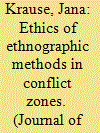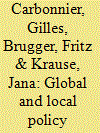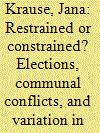| Srl | Item |
| 1 |
ID:
178710


|
|
|
|
|
| Summary/Abstract |
This article examines the ethics of using ethnographic methods in contemporary conflict zones. Ethnographic research is an embodied research practice of immersion within a field site whereby researchers use ethnographic sensibility to study how people make sense of their world. Feminist, conflict and peacebuilding scholars who research vulnerable populations and local dynamics especially value ethnographic approaches for their emphasis on contextual understanding, human agency, egalitarian research relationships and researcher empathy. While immersion leads to knowledge that can hardly be replaced by using more formal approaches, it also elicits ethical dilemmas. These arise not only from the specific research context but also from who the researcher is and how they may navigate violent and often misogynous settings. I argue that many dilemmas may and perhaps should not be overcome by researcher skill and perseverance. Instead, ethical challenges may lead researchers to adopt limited and/or uneven immersion in their field site, not as failed or flawed ethnography but as an ethical research strategy that incorporates ethnographic sensibility to a varying extent. Examining why researchers may opt for limited and uneven immersion is important because in conflict research, stereotypes of the intrepid (male) researcher with a neutral gaze still tend to mute open discussions of how gender, race, ethnicity, nationality, class and other background factors inevitably shape immersion. This article seeks to contribute to creating discursive space for these conversations, which are vital for researchers to analyse, reflect and write from the position of a ‘vulnerable observer’ and incorporate greater transparency in the discussion of research findings.
|
|
|
|
|
|
|
|
|
|
|
|
|
|
|
|
| 2 |
ID:
104444


|
|
|
|
|
| Publication |
2011.
|
| Summary/Abstract |
This article examines the most significant international policy responses that seek to address the resource trap and spur development in resource-rich, but fragile states. It applies a regime theoretical framework to assess recent multistakeholder initiatives within the extractive sector by focusing on the processes through which they seek to alter the behavior of public and private organizations. Based on a review of the Nigerian and Azeri cases, the article finds that civil society often does not have the capacity to live up to the high expectations placed on it by these initiatives. The effectiveness and eventual success of multistakeholder initiatives in the extractive sector require exploring alternative pathways to affect behavior of key actors. Stronger market incentives and regulation can provide the conditions required for extractive activities to result in positive development outcomes.
|
|
|
|
|
|
|
|
|
|
|
|
|
|
|
|
| 3 |
ID:
170813


|
|
|
|
|
| Summary/Abstract |
Anecdotal evidence suggests that sexual violence varies significantly across cases of election violence and communal conflicts but systematic research is scarce. Post-election violence is particularly likely if electoral mobilization further polarizes longstanding communal conflicts and political elites do not instruct security forces to intervene decisively. I comparatively analyse two prominent cases of post-election violence in Kenya (2007/8) and Nigeria (2008) that exhibit stark variation in sexual violence. Patrimonial networks and norms of violent masculinity that increase the probability of (gang) rape were present in both cases and do not explain variation. Civil war research has identified three explanations for the variation in sexual violence: situational constraints; ordered sexual violence or restraint; and bottom-up dynamics of sexual violence or restraint. I examine these for the context of post-election violence. I argue that the type of communal conflict triggered by electoral mobilization explains variation in sexual violence. In Kenya, pogroms of a majority group against a minority allowed for the time and space to perpetrate widespread sexual violence while in Nigeria, dyadic clashes between similarly strong groups offered less opportunity but produced a significantly higher death toll. These findings have important implications for preventing election violence. They demonstrate that civilian vulnerability is gendered and that high levels of sexual violence do not necessarily correspond to high levels of lethal violence. Ignoring sexual violence means underestimating the real intensity of conflict and its impact on the political process.
|
|
|
|
|
|
|
|
|
|
|
|
|
|
|
|